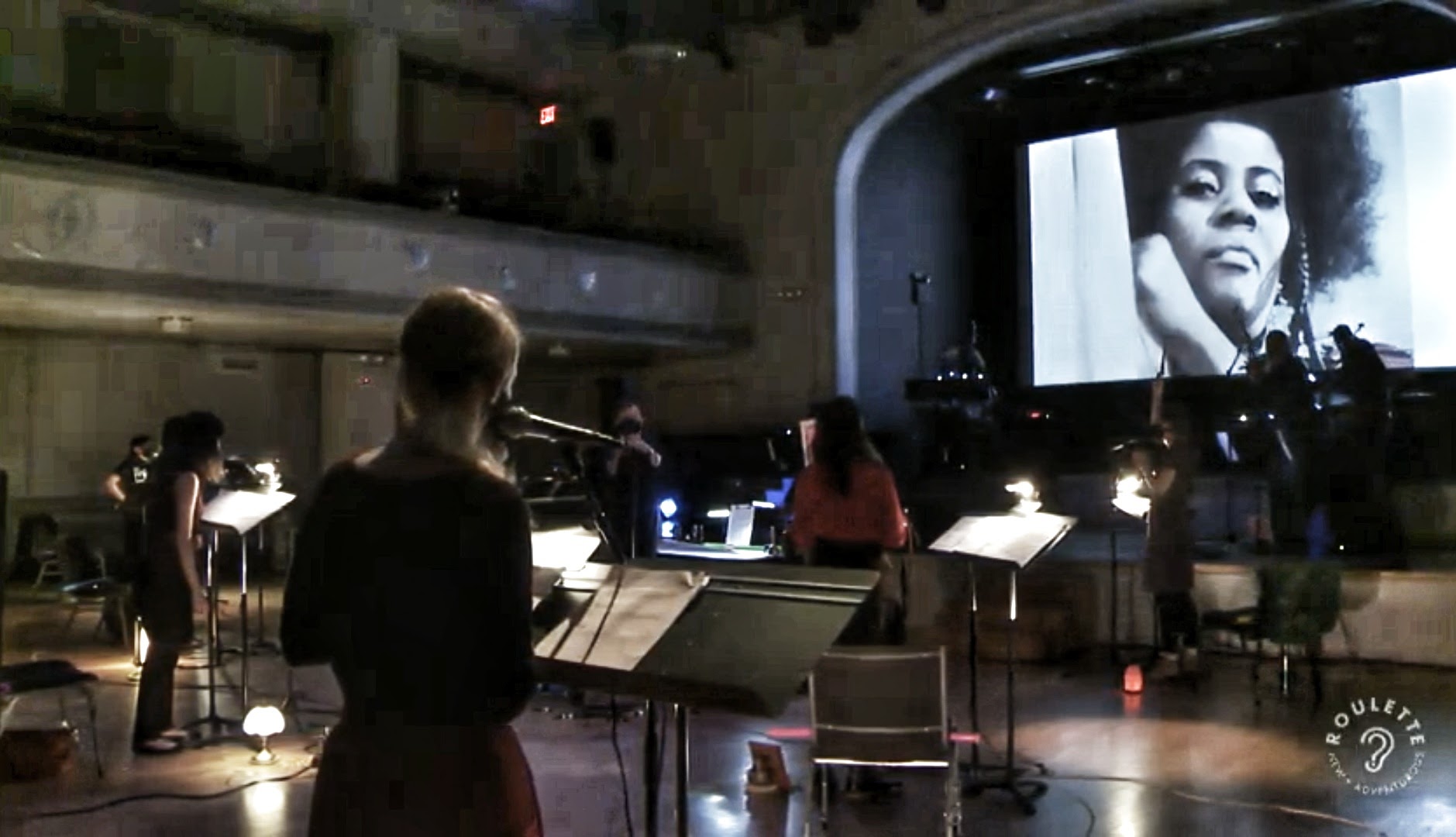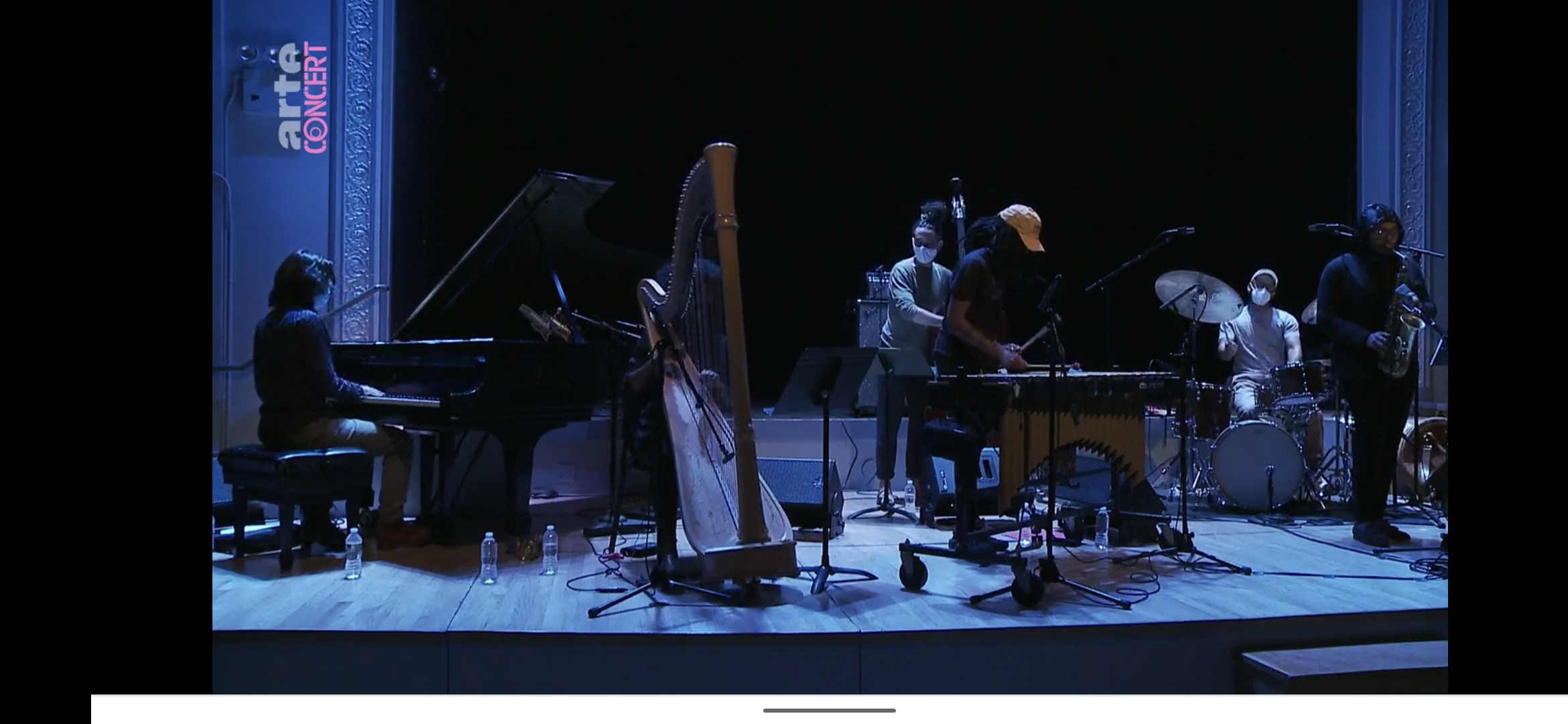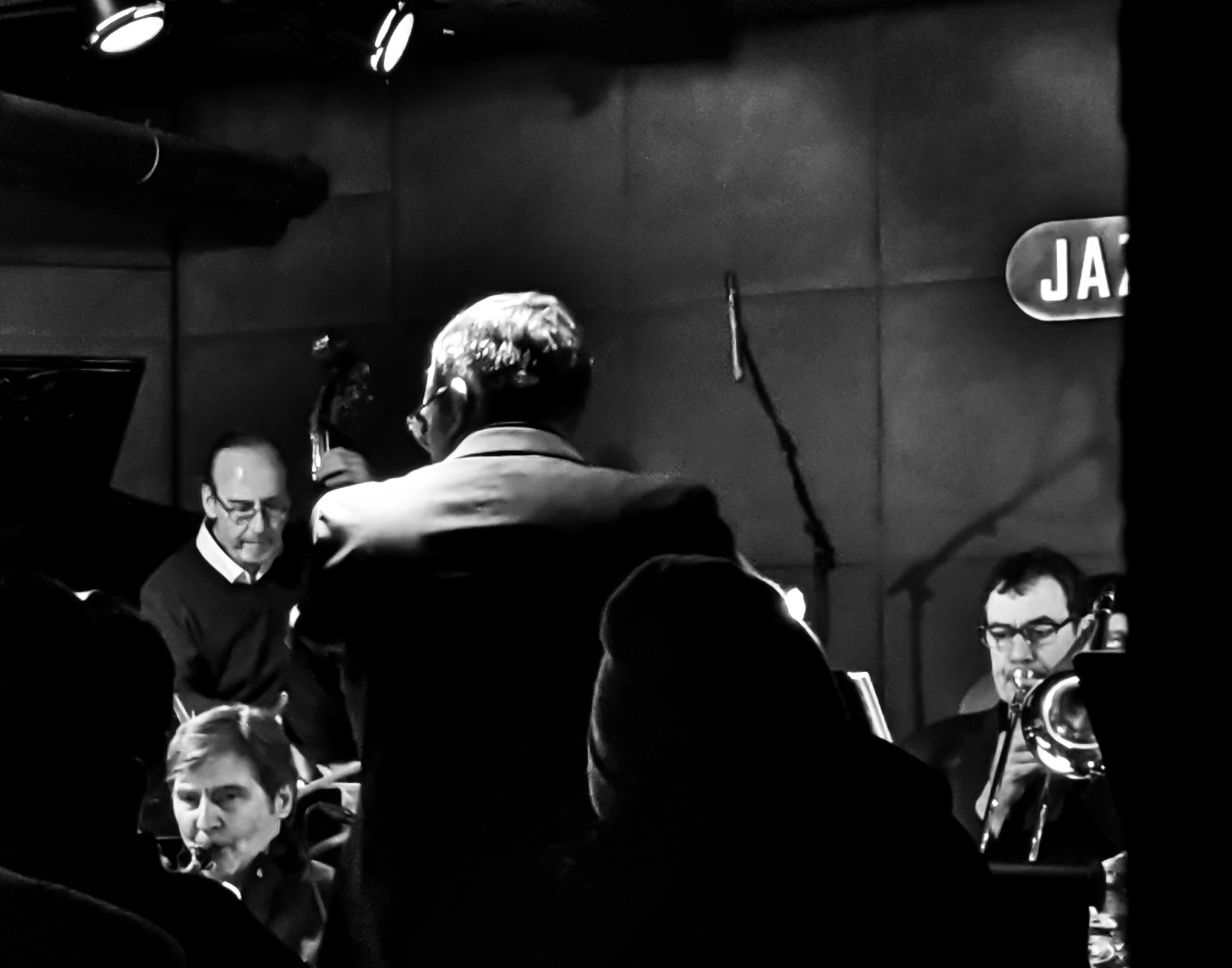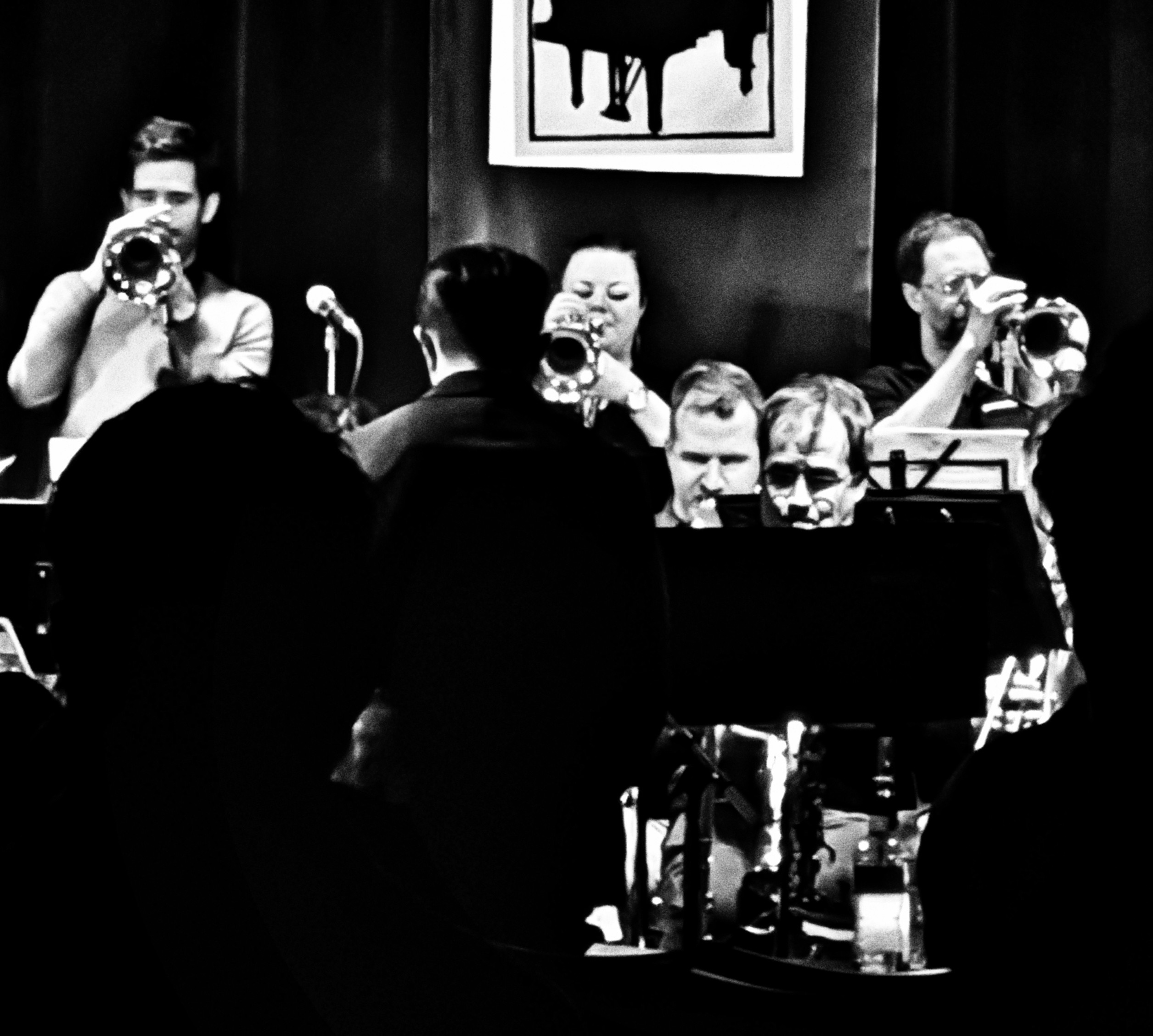Here are some things that moved me in jazz, classical, and other instrumental (mostly) forms this year.
https://tidal.com/browse/playlist/bbe455af-3b1f-4a30-a42c-9a967bc93869
- Wild Up/Julius Eastman, “If You’re So Smart, Why Aren’t You Rich?” – The ensemble Wild Up continues their vital grappling with/resurfacing the once-thought-lost work of composer Julius Eastman with a third volume containing several of the pieces on the original three-disc anthology I had the hardest time grappling with. The acidic overtones and sharp stabs on this sardonic, jagged piece are perfectly executed here, under the baton of Christopher Rountree, and reflect a world I see in a way I didn’t when I first heard the piece, also laying bare the sense of hope inherent in getting off the mat every time.
- Wadada Leo Smith and Orange Wave Electric, “Nzotake Shange” – One of America’s finest composers and trumpeters, Wadada Leo Smith (Anne said, after watching a quartet set at the Stone, it sounded like “Falling down stairs” and she wasn’t wrong but in a good way), assembled a dream team of electric downtown-associated players for his remarkable record Fire Illuminations: guitarists Nels Cline, Brandon Ross, and Lamar Smith; bassists Bill Laswell and Melvin Gibbs; electronic musician Hardedge; percussionist Mauro Refosco; and drummer Pheeroan akLaff. Each tune reflects on an individual or a specific moment in history, and this piece, named for the poet and playwright who broke me when I read for colored girls 15 years after it premiered, exemplifies everything I find so intoxicating about the album, the deep groove and the perfectly refined and directed shots of fire spraying over it.
- Irreversible Entanglements, “root ⇔ branch” – Irreversible Entanglements not only blew my hair back twice this year but also put on an even more assured and powerful second album, Protect Your Light. This piece, partly in tribute to jaimie branch, has been a favorite since I first hit play, and it’s still a balm, horns slowly waltzing through Moor Mother’s poetry and the deep, circular groove of Luke Stewart’s bass before erupting into a hip-swaying march. “Let the horns open the day and get free.”
- Johnathan Blake, “Lament for Lo” – Drummer Johnathan Blake released his best record as a leader with this year’s Passages, and it’s full of great players. Still, I kept coming back to this drum solo intro/tribute to fellow New York drummer Lawrence “Lo” Leathers, both as a tribute to conciseness in a playlist more given to sprawling statements and a reminder of how much texture and emotional content one instrument being played alone can be.
- Darcy James Argue’s Secret Society, “Last Waltz for Levon” – I’ve been waiting for several of the pieces on Darcy James Argue’s latest record, Dynamic Maximum Tension, to be collected on a recording for a very long time. This one, written in the wake of The Band drummer Levon Helm’s passing, I saw him do almost ten years ago in the basement theater of subculture, and he introduced it by paying tribute to Helm’s deep, instantly recognizable pocket. The Secret Society pays tribute to that slippery waltz that shadow-painting sense of time, in one of a record packed with gems – until writing this, the Duke Ellington tribute “Tensile Curves” was my choice for the playlist periodically, it was the Buckminster Fuller-inspired piece – and I can’t wait to see this band again at Big Ears finally.
- Henry Threadgill, “The Other One: Movement III, Section 13” – Henry Threadgill followed one of the all-time great music memoirs, Easily Slip Into Another World, with a stunning chamber music record, The Other One, from which this is drawn. Not playing horn, just conducting, Threadgill’s affinity for tension and mystery in dynamics shines through loud and clear and his facility for strings takes on dimensions I wasn’t expecting.
- Kali Malone, “Does Spring Hide Its Joy v2.1” – One of the standout performances I saw at Big Ears last year, composer and organist Kali Malone convenes a trio with cellist Lucy Raiton and guitarist Stephen O’Malley for a long record of beguiling riffs on melodic cells glowing with long tones.
- Ingrid Laubrock and Cecilia Lopez, “LUNA MAROMERA” – Ingrid Laubrock put out several good records this year but I kept coming back to this duo record with Cecilia Lopez on electronics, Maromas, a continued investigation of the duo format from one of my favorite saxophonists, that also beguiled me when Anne and I saw the duo in Brooklyn in the Spring. There’s grit here, the ragged breathy tones and the long pulses that decay unevenly, that add to the inherent mystery.
- Thandi Ntuli and Carlos Niño, “Lihlanzekile” – Producer/percussionist Carlos Niño has gotten a lot of deserved heat this year, I saw him anchor a brilliant trio with Surya Botofasina and Nate Mercereau at Winter Jazzfest in January, and my favorite record of his was this gorgeous duo album with South African pianist Thandi Ntuli. This closing track, translating to “It is clean”, was a piece I returned to over and over, an undulating landscape that changes every time I try to perceive it.
- Andre 3000, “BuyPoloDisorder’s Daughter Wears a 3000® Button Down Embroidered” – The record that put Niño’s name into the wider American consciousness and which I liked a lot; though, as I discussed with Andrew Patton, it fits more neatly into the ambient genre or even downtempo electronica than the “flute jazz” box some people who didn’t know that was a genre tried to put it in. This track features the trio I mentioned above, creating alongside Andre Benjamin, and is one of the two tracks to feature flute instead of what I think is an EWI. It’s beautiful.
- Allison Miller, “Fierce” – One of my favorite composer-drummers, Allison Miller, outdid herself this year with a small group record co-sponsored by a series of art spaces with Lake Placid Center for the Arts in the lead, Rivers in Our Veins. As always, she assembled a remarkable group of musicians with a deep history with her and each other: Jenny Scheinman on violin, Jason Palmer on trumpets, Ben Goldberg on clarinets, Carmen Staaf on keys, and Todd Sickafoose on bass. The intertwining – I think – Rhodes and acoustic piano comping under Scheinman’s solo that seems to burble out of Goldberg’s is a highlight of this track, and there’s not a dull track on the album. The interplay is really as good as it gets.
- Damon Locks and Rob Mazurek, “Yes!” – Trumpeter, composer, and bandleader Rob Mazurek has worked with composer/bandleader/polymath Damon Locks in a variety of settings, most notably Mazurek’s shifting Exploding Star Orchestra, but distilling their two languages down to a duo on New Future City Radio paid off big, both on this record and seeing them live at Big Ears.
- MEM_MODS, “Midtown Miscommunication” – One of my sleeper favorites in the good-for-all-parties category, a deep Memphis groove project from Paul Taylor (Amy Lavere, New Memphis Colorways), Steve Selvidge (Big Ass Truck, Hold Steady, Lucero), and Luther Dickinson (North Mississippi Allstars).
- James Brandon Lewis and the Red Lily Quintet, “Were You There” – Saxophonist James Brandon Lewis reconvenes my favorite of his bands, the Red Lily Quintet – Kirk Knuffke on cornet, William Parker on bass, Chad Taylor on Drums, Chris Hoffman on cello – for a tribute to his Grandmother by way of paying tribute to the pioneering gospel singer Mahalia Jackson. Every song on For Mahalia, With Love, is a winner, with deep soulful grooves and stretching out without sacrificing any bit of these timeless melodies. The colors of the instruments coming in on this one remind me of Beethoven’s 9th in the best way.
- Chris Potter, “You Gotta Move” – Saxophonist Chris Potter has a special affinity for the Village Vanguard. His newest record, Got the Keys to the Kingdom, is another stunning example. Potter and his powerful quartet – Craig Taborn on piano, Scott Colley on bass, and Marcus Gilmore on drums – tear into and pay homage to fascinating repertoire throughout the record, but I kept coming back to this glorious cubist-gutbucket take on Mississippi Fred McDowell’s “You Gotta Move.”
- Mendoza Hoff Revels, “Echolocation” – Also blues-inflected but with open arms for everything since, the collaboration between guitarist Ava Mendoza and bassist Devin Hoff, featuring James Brandon Lewis in a more coiled, snarling mode than I’m used to, and Ches Smith’s powerful drumming, is the best avant-rock ensemble I’ve heard in recent memory. The liner notes referencing Ornette Coleman’s Prime Time and later Black Flag ring true, but this doesn’t sound like anyone else.
- Tyshawn Sorey, “Seleritus” – Drummer and composer Tyshawn Sorey digs into the corners of the songbook with his killing trio of Matt Brewer on drums and Aaron Diehl on piano on Continuing. This deep dive into an Ahmad Jamal piece captures the space and silence of Jamal’s kind of shorthand in the common parlance but also captures the heaviness he always brought to the bandstand. A majestic tribute that plays everything these three have learned about the source and brought to their own work through the original.
- Love in Exile, “Eyes of the Endless” – This supergroup of Arooj Aftab, Vijay Iyer, and Shahzad Ismaily exceeded every expectation I had going in as a big fan of all three players and writers. This piece has Iyer on Rhodes instead of the normal acoustic piano, and both the heavy strike and the ring of that instrument give the astonishing melody from Aftab a different, shimmering texture, like a cape being flung off and tossed into a bay.
- Kurt Rosenwinkel and Geri Allen, “A Flower is a Lovesome Thing” – The gods of reissuing blessed us with a remarkable document of a duo concert in Paris in 2012 before Allen’s untimely passing. Two voices that shaped the jazz players my age and younger as much as anybody else explode this tune, one of my favorite Billy Strayhorn pieces, thoughtfully, out of love. Every note of this holds the next, waiting to be born, but not in a way that ever feels rote or obvious.
- Aaron Diehl and the Knights, “Gemini” – Speaking of acts of love, it’s hard to compete with this one. The great Mary Lou Williams wrote her Zodiac Suite – which many jazzers play at least parts of to this day – as a through-composed chamber suite but it’s – I don’t think – ever been recorded as such. Masterful pianist Aaron Diehl restored the score and teamed up with NYC guardians of the contemporary canon, The Knights, for a beautifully recorded, definitive reading.
- Roy Hargrove, “The Love Suite: In Mahogany – Obviously Destined” – Another gift from the reissue gods: a pristine recording of the 1993 Alice Tully Hall performance of trumpeter-composer Roy Hargrove’s piece The Love Suite: In Mahogany. This movement highlights both Hargrove’s sizzling horn playing and Marc Cary’s piano (that solo a couple of minutes in undulates with silky dynamism, but everyone – Jesse Davis, Ron Blake, and Andre Heyward comprise the rest of the horn section, Rodney Whitaker and Gregory Hutchinson keep things moving and held down as the remainder of the rhythm section – kills it here.
- Yasmin Williams featuring Aoife O’Donovan, “Dawning” – Columbus was finally blessed with Yasmin Williams as the Wexner Center this year after several cancellations. The entire performance floored me, but I was especially intrigued by this new piece she introduced, revealing Aoife O’Donovan’s involvement. The studio recording delivers on all the promise that collaboration holds. Williams lets every note ring on its own, rolls feel like last year’s snow finally slipping down cliff sides, in a slow drag tempo perfectly suits O’Dovonan’s wordless vocals.
- Chad Fowler/Zoh Amba/Ivo Perelman/Matthew Shipp/William Parker/Steve Hirsh, “Sentient Sentiment” – Chad Fowler, here on stritch and saxello, assembles a contemporary fire music supergroup and lets them loose in a frenzy of ecstatic, deeply thoughtful play on the five tracks of Alien Skin. The single show I was sorriest to miss in my town was Zoh Amba’s local debut featuring Chris Corsano, and I heard it was just as good as I’ve heard her in the past. Her lines exquisitely intertwine with Fowler’s and Perelman’s, particularly on this slow burn that blossoms into a line of explosions, as Parker, Shipp (both of whom appear elsewhere on this playlist), and Hirsh set up a baseline that shifts exactly as the music needs to.
- Wolf Eyes, “Engaged Withdrawal” – I’ve been a fan of Wolf Eyes almost as long as I’ve been digging William Parker and Matthew Shipp, and their Dreams in Spattered Lines is another classic, with maturity as a blessing and not a crutch. This song creeps at a measured pace, Nate Young and John Olson leaving one another enough space and care, enough listening, to each make a proper impression on a record that has everything in its place and wastes no gesture, no moment.
- David Lang/Cincinnati Symphony Orchestra/Sō Percussion, “man made” – The CSO (not that one, the other one), under their director Louis Langrée, teamed up with leading NYC contemporary troupe Sō Percussion for the first recording of David Lang’s stunning piece “man made.” Lang’s program note about the orchestra acting as translators and decoders, for the less traditional instrumentation and movement of the percussion quartet rings true, and that process – showing the strings – makes it all more magical rather than less.
- Matthew Shipp, “The Bulldozer Poetics” – Shipp continues his growth into a clearer more approachable, even when the work itself gets thornier and more complex, like the world, piano style on the phenomenal solo album The Intrinsic Nature of Shipp. From the crush of those first notes, this driving piece sets up an entire world.
- Curtis J. Stewart, “vii. Adagio from Johannes Brahms Sonata No. 1 Op. 78 (We Are Going to Be OK)” – Violinist/composer/arranger Curtis Stewart’s remarkable solo record of Love is one of those gargantuan acts of love I keep talking about and being drawn to. An expansive weaving together of pieces he’s been playing for years and knows well by composers who still speak to him, like Brahms and Ellington, and originals, played in tribute to his late Mother in her Upper West Side apartment.
- Kieran Hebden and William Tyler, “Darkness, Darkness” – This collaboration between Kieran Hebden, the electronic musician better known as Four Tet, and avant-Americana guitarist William Tyler, delighted me, particularly this take on the Youngbloods song “Darkness, Darkness.” It unfurls slowly, letting the listener glimpse it in pieces, coming into view like a slowly backing-up camera refocusing every few seconds and coalescing into a powerful groove.
- Rob Moose featuring Phoebe Bridgers, “Wasted” – yMusic co-founder violinist Rob Moose teamed with a variety of singers on his dazzling Inflorescence EP. I kept coming back to this fragile, pulsing collaboration with Phoebe Bridgers. The strings are both stabbing and enveloping light here. “Standing in the parking lot, in the glow of a Rite-Aid sign, everyone I know is staying in tonight. I’ve been here before, just screaming at a cell phone. Seems like a couple of months went by, but it’s years ago.”
- Gerald Cleaver, “Of the American Dream” – One of the finest jazz drummers, Gerald Cleaver, has been working up a second strain of electronica-based music that I think hit its most assured and together expression yet with 22/23.
- JD Allen, “Mx. Fairweather” – JD Allen stepped into the ring with electronics on THIS without sacrificing any of that rich, rounded tone. His great trio – Alex Bonney on those electronics and effects, Gwilym Jones on drums – attack this ballad and the other gorgeous originals on the record with subtlety and laser focus.
- Nubya Garcia, “Lean In” – This killer single from one of my favorite London sax players, Nubya Garcia, summons up some of the textures of the garage club music she grew up with for an infectious mix.
- Sexmob, “Club Pythagorean” – Downtown New York institution Sexmob – Steven Bernstein, Briggan Krauss, Tony Scherr, Kenny Wollensen – brought longtime collaborator Scotty Hard (Prince Paul, Mike Ladd, Antibalas) into the fold as a full member on their electrifying The Hard Way. This track also features John Medeski on Mellotron for a powerful groove bursting with hooks.
- Javier Nero, “Kemet (The Black Land)” – Trombonist-composer Javier Nero leads a large band – including guest Sean Jones on a crackling solo on this title track – paying tribute to the ancient African empire of Kemet. The wordless vocals and frenetic cymbal work from Kyle Swan set up gorgeous massed horns, and killer vibes work from Warren Wolf, and a sizzling solo from Nero.
- Marquis Hill featuring Joel Ross, “Stretch (The Body)” – Trumpeter Marquis Hill approached the ways intention can give our lives meaning and thoughtless action/habits can decay us, in a way that made more musical sense than any other such attempt I can think of, with the riveting Rituals + Routines. This track features vibes player Joel Ross painting constellations around the tight quartet of Hill, Junius Paul, Micheal King, and Indie Buz.
- Chris Abrahams, Oren Ambarchi, Robbie Aveniam, “Placelessness (Side B excerpt)” – Chris Abrahams (The Necks’ pianist) brought together this trio of avant-garde guitarist and electronics player Oren Ambarchi and drummer Robbie Aveniam for Placelessness, two extended tracks of throbbing minimalism. Those squiggles around the minute mark, creating an interference color between the circular piano figure and the stuttered drums, were my initial handhold into the world of this music, and they still excite me.
- Greg Ward Presents Rogue Parade, “Noir Nouveau” – Chicago alto player Greg Ward brings together some of his town’s finest players under the Rogue Parade name – Matt Gold, Dave Miller, Matt Ulery, Quin Kirchner – for the delightful concept album Dion’s Quest. This cinematic piece builds slowly, like shadows creeping along a wall, and develops sharper edges and flashes of light.
- Sara Serpa and Andre Matos, “Carlos” – The vocalist pushing the boundaries furthest in the jazz/improvisation world right now, Sara Serpa, found an exquisite foil in guitarist/bassist Andre Matos. They assembled a great band consisting of Dov Manski on keys, João Pereira on drums, Okkyung Lee on cello, and Sofia Jernberg on additional vocals for the astounding album Night Birds. This original builds up from cells, sharing some sound-world commonality with the last two tracks, and flies to another place entirely.
- Lawrence English and Lea Bertucci, “A Fissure Exhales” – I’ve been a big fan of Lea Bertucci’s playing and soundscapes for years. This collaboration with field recordings and tape manipulation artist Lawrence English, a standout track for me from their record Chthonic summons a sense of glacial motion, like many of the instrumental records that drew me this year, brings an entire world into my view and keeps revealing new mysteries.
- Chief Xian aTunde Adjuah, “Shallow Water (Tribute Big Chief Donald Harrison Sr., Guardians of the Flame)” – The power of the statement in Chief Xian aTunde Adjuah leaving his – up to now – primary instrument, the trumpet, behind in favor of his self-created Chief Adjuah’s bow and vocals, paid off big in his remarkable Bark Out Thunder Roar Out Lighting, a mythopoetic tribute to all New Orleans has given us and everything it can still be. This tribute to the great Donald Harrison, Sr., features electrifying playing from Weedie Braimah on percussion, Luques Curtis on bass, and Marcus Gilmore on drums, among excellent guests.
- Dan Wilson, “Bird Like” – Akron-based guitarist Dan Wilson grapples with his influences on the terrific Things Eternal, leading a great quartet of Glenn Zaleski on Rhodes, Brandon Rhodes on bass, and David Throckmorton on drums. The fluid lines and gleeful interplay make this Freddie Hubbard classic vibrantly, wrigglingly, alive.
- Matana Roberts, “a caged dance” – Anything Matana Roberts does is worthwhile, and the fifth chapter in her Coin Coin series, delving into her family history and examining its context in American and specifically Black American history, In The Garden, might be the best installment yet. Produced with aplomb by Kyp Malone (TV on the Radio) and a large band of excellent musicians, including Mike Pride and Ryan Swift on drums, Stuart Bogie and Darius Jones on reeds, and Mazz Swift on violin, there’s not a weak track to be found. The stuttering, walking-the-line-between early 20th-century jazz and mid-century free jazz intro of this tune grabbed me immediately, and the rest of the track never let go.
- Angel Bat Dawid, “INTROID – Joy ‘n’ Stuff’rin” – When I interviewed Angel Bat Dawid years ago, she was working on the multimedia Requiem for Jazz project. While I’m still chomping at the bit to see it realized, the record was maybe the most ambitious and moving jazz and jazz-adjacent piece I’ve heard all year. Massed vocal writing and those interweaving horns on this tune… it doesn’t get better. I’m still unpacking this Requiem and will be for a while.
- Ambrose Akinmusire featuring Bill Frisell and Herlin Riley, “Owl Song 1” – Trumpeter-composer Ambrose Akinmusire assembled a trio of guitarist Bill Frisell and drummer Herlin Riley for the gorgeous Owl Song. This lead-off track is a tribute to all three players’ dedication to tone, space, and adventuring spirits.
- Missy Mazzoli/Third Coast Percussion, “Millenium Canticles Pt 5, Survival Psalm” – The “Millenium Canticles” suite by Missy Mazzoli, one of my favorite composers and who makes one more appearance on this playlist, is the opening salvo to Third Coast Percussion’s dynamic Between Breaths and this final movement feels like you’ve just made your way to shore. A tribute to finding ways and reasons to live.
- Beverly Glenn-Copeland, “Harbour (Song for Elizabeth)” – Beverly Glenn-Copeland’s first record in 20 years is a rapturous collection of art songs only he could write. The melody and lyrics of this song, in particular, wrecks me every time. “Don’t you know that you’re the deep, where water, earth, and fire meet? Don’t you know that when you sleep, life’s laughing, weeping?”
- Mark Lomax II featuring Scott Woods, “Ho’oponopono” – One of the performances I was sorriest to miss in the fall of 2022 was the premiere of Columbus’s greatest composer Mark Lomax’s newest collaboration with poet Scott Woods, Black Odes. I’m still sorry I wasn’t in town to see it, but the record is a spectacular document of an opening into a new era for two of our finest artists. “What else do I need but this hem? / What else do I need to decolonize this kiss to make it a worthy offering?”
- Missy Mazzoli/Arctic Philharmonic, “These Worlds In Us” – I’ve been a big fan of Missy Mazzoli’s writing since I heard her chamber ensemble Victoire on a blog, and a year or two later saw them in Chicago’s Millennium Park. Her work has grown more expansive, covering a multiplicity of forms, and finally, there was a collection under her name with a variety of uncollected orchestra pieces, Dark With Excessive Bright. This one, new to me, was an immediate favorite and falls into my usual tone: a prayerful/hope-for-the-world piece I like to end these playlists on. Thank you all for reading/listening. I love you.





